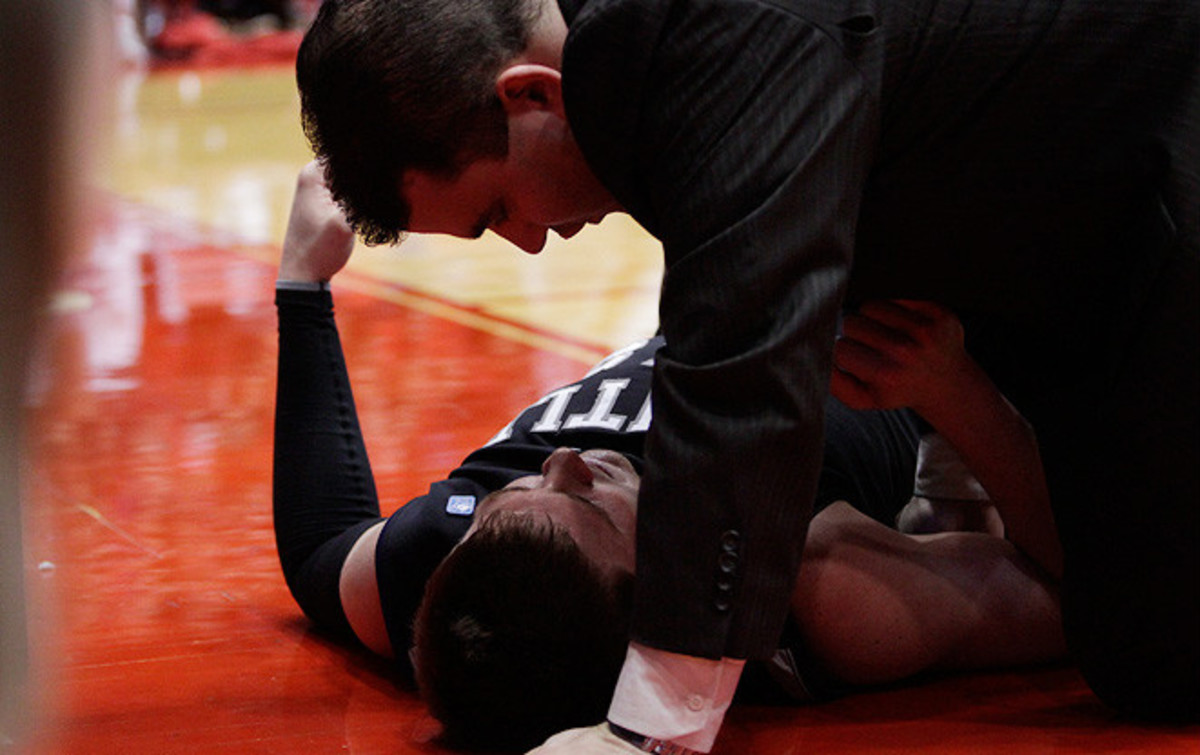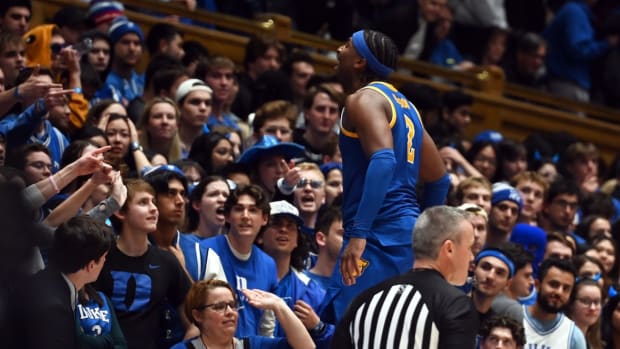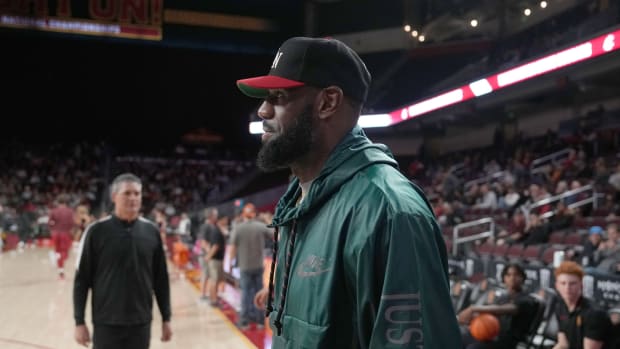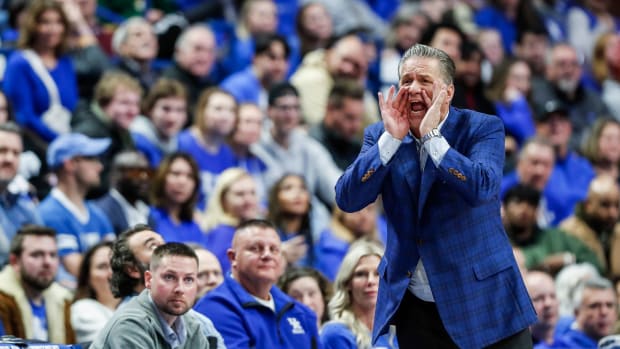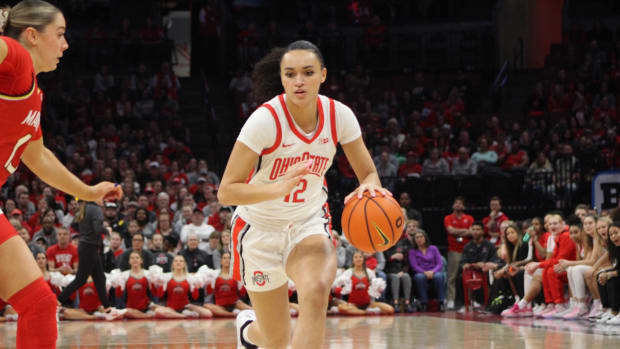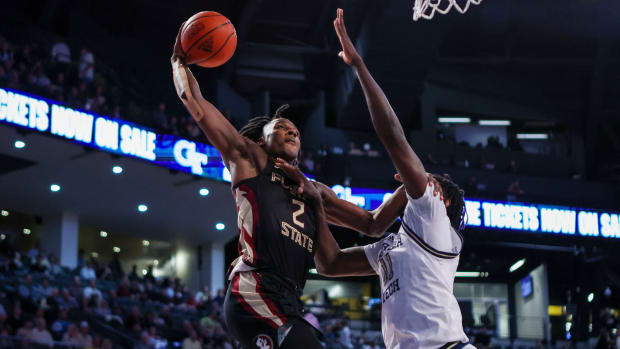Butler's Rotnei Clarke learns valuable lesson after scary injury
From his neck down, Clarke could feel only numbness and tingling. In the stands, Clarke's dad, Conley, saw "the scared look" in his son's eyes and knew it was bad. "I had seen him get hurt a lot," says Conley. "But he had always popped right back up." Stevens walked over and stared hard at his fallen player, willing the feeling back into his limbs. Clarke's arms moved, but he had no control of them. He did, however, have control of his voice: "I'm not coming out," he told the medical personnel hovering over him.
A season as fun and successful as Butler's had been a long time coming for Clarke, an Oklahoma school-boy legend who wears his short, brown hair pushed into a distinctive peak that he calls "my version of a fauxhawk." After spending three years in relative obscurity playing for Arkansas, an SEC also-ran, Clarke had found what he considered an ideal fit at Butler. He loved Stevens and his staff. He and his teammates were great friends. Together they were winning, they were ranked (14th at the time) and they were producing a lot of gritty, exciting, never-say-die basketball.
In Butler's thrilling 72-71 win over Marquette in Maui on Nov. 19, it was Clarke's 30-foot bomb, launched with a defender in his face, that won the game at the buzzer. In Butler's OT win over then No. 1 Indiana in December, walk-on Alex Barlow hit the buzzer beater, but Clarke led all scorers with 19 points, including five threes. Thanks to his accuracy, his confidence and his quick release -- according to Conley, the time between Clarke catching and shooting has been clocked at .6 second -- he was leading the team with 16.2 points and 3.7 threes a game and earning kudos from ESPN's Jay Bilas as the top three-point shooter in the country.
"It's arguable who is the best standstill three-point shooter," says Stevens, "but I don't know that there's anybody I've ever seen in the last three years who can make so many tough threes with just a sliver of daylight."
Laying on the floor in Dayton, Clarke knew his situation was probably serious, despite his defiant declaration that he'd keep playing. As minutes ticked by and medical personnel pondered how to move him, he tried to stay positive. "I tried to think as many good things as I could, that I was going to be OK and that everything was going to be fine," he says.
Remarkably, everything was fine. By the time Clarke got to the hospital the numbness and tingling had started to wane. Scans and X-rays revealed nothing worse than a severely sprained neck. A relieved Stevens tweeted a picture of Clarke in his hospital bed, holding up his sliced-open blue jersey. Not long after he arrived at the hospital on a backboard, Clarke walked out of it with just a soft brace around his neck.
"He is really lucky," says Stevens. "There was a distinct possibility he wouldn't walk again."
The space between injury and hospital exit was only about two hours, but that was enough time to change Clarke's perspective on life, to remind him of what matters most to him -- family, friends, his faith in God. "It hit like I've never been hit before," he says. "There are more important things than a game of basketball."
Make no mistake, basketball is still important. His initial rehab from his injury, the cure for all the irritation his spine had suffered, was to do nothing. "That was the worst thing for me," he says. When Clarke got his medical release Thursday night to play Saturday, against Temple, after missing three games and nearly two weeks of practice, Conley, a skills development coach who still serves as a his son's shooting coach, was with him as he launched shots in Hinkle Field House. "It's the first time I've seen him truly happy in two weeks," says Conley. "He was just like a happy little puppy."
*****
Clarke discovered his passion for hoops early. Conley, who had met his wife, Chris, when they were both athletes at Missouri's Tarkio College in the late '80s, had named their first-born after Rotnei Anderson, an Oklahoma Sooners running back who graced the Nov. 16, 1987 issue of Sports Illustrated, because, says Conley, "(Anderson) was fast, and I wanted him to have a fast name." But before he could really test his wheels, little Rotnei got a plastic toy basketball goal for his second Christmas. "That's when he became addicted, right there," says Conley.
By seventh grade, Clarke was shooting 500 shots a night at the gym of whatever high school employed Conley, then a basketball coach, and Chris, a volleyball coach and business teacher. "We moved around a lot," says Chris. "But we always had keys to a gym."
When Clarke was entering eighth grade, his family (Rotnei's sister, Cassie, just finished her final season playing volleyball at St. Louis) moved from Oklahoma to Denison, Texas, where Conley's brother, Kelly, had landed a head basketball coach position at Denison High School and offered Conley the assistant's job. In one year, Clarke wore out the school's new Gun machine. Right before he started high school, the family moved back to Oklahoma, settling in Verdigris, a tiny, one-gas station town about 20 miles northeast of Tulsa, where Kelly and Conley replaced the outgoing basketball staff.
Clark's legend caught fire his sophomore year, when he scored 41, 44 and 55 points in three games in a tournament. "After that it was hard to get into our high school gym for games," says Conley. At an area playoff game at 2500-seat gym of Bixby High during Clarke's junior year, 300 people were turned away at the door and didn't get to see him score 57 points. When opponents' home courts became seething pits of hostility, with fans shouting profane insults about him, his mom and his sister, Clark would channel his favorite player of the time, Duke's JJ Redick. "There were always people yelling at him, screaming at him, trying to get in his head," says Clarke. "I admired how he never allowed it to affect him."
During the first round of the state tournament his junior year, Verdigris played Vian, a team with three future DI football players. One of them, a linebacker, guarded Clarke all night -- until he got thrown out of the game with his second technical foul. Despite the aggressive defensive attention and an allergy attack that hindered his breathing, Clarke scored 60 points, the highest one-game total in state tournament history. The following season he set a new Oklahoma high school scoring record, with 3,758 points, and led the Cardinals to their first 2008 Class 3A title. The town of Verdigris showed its appreciation by renaming a road leading to the high school Rotnei Clarke Road.
Clark turned down Kansas, Kentucky, Oklahoma, Oklahoma State, Memphis and Gonzaga, among others, to sign with Arkansas. He liked the staff, he liked the fans, he liked the facilities and he knew he'd get an opportunity to play right away. As a bonus, his maternal grandmother lived in Fayetteville. (His immediate family would relocate there, as well.) He played well, hitting 13 threes and scoring 51 points in a game as a sophomore and averaging 15.2 points and making the all-SEC second team as a junior. But the Razorbacks lost as often as they won and never made it to the NCAA tournament. After coach John Pelphrey was fired in March 2011 and was replaced by Missouri coach Mike Anderson, Clarke stuck around a few months, decided the situation "didn't feel comfortable" and got his release.
Clark estimates that 40-50 schools contacted Arkansas's compliance office to express interest. He considered four or five of them before settling on Butler, a program that hadn't recruited him out of high school but had impressed him with back-to-back appearances in the national title game in 2010 and 2011. "I wasn't interested in things like top-notch facilities anymore," says Clarke. "I was interested in being around good teammates, good people; I wanted to be able to trust the coaches. And the success Butler had had the previous two years really attracted me."
Sitting out for a transfer year had its pros and cons. Clarke hated not playing in games, but he had wanted a redshirt year to improve his game. He did that by facing Ron Nored, one of the best defenders in the nation, every day in practice. "I'm not the quickest guy so playing against a defender like that, you find ways to get by, you find different ways to come off a screen," says Clarke, who became best friends with Nored, now the coach at nearby Brownsville High.
When the team left him behind for road trips, Clarke would haunt iconic old Hinkle, blasting Christian rap as he shot at a hoop, sometimes until four in the morning, to get in his daily dose of 500 makes. "Hinkle is probably one of the coolest places I've been able to shoot in or play in, because of the history it has," he says. "At night it would just be me and the ball and basket; that was all that mattered to me. Shooting puts me at ease, it puts me at peace, it takes everything else off my mind."
To indulge his nightly habit Clarke, who had keys to the gym everywhere he lived as a kid, often had to rouse a security guard or campus police to let him into Hinkle. Stevens agreed it made a lot of sense to give Clarke and all his teammates keycards to Hinkle so they could shoot whenever they felt like it. "Our team gets in the gym twice as much because of Rotnei's presence," says Stevens. "He is the ultimate gym rat."
After two straight trips to the Final Four, the rebuilding Bulldogs struggled last season before winning nine of their last 12 games and making it to the semifinals of the CBI tournament. This year they started the season unranked, but thanks to the presence of Clarke, the development of players like senior center Andrew Smith and sophomore forward Roosevelt Jones and the team's ability to adjust to a very limited playbook in Clarke's absence -- without him the Bulldogs won two, including a buzzer-beater over Gonzaga, and lost one, a 54-53 nailbiter at LaSalle -- they're 16-3 and ranked ninth heading into Saturday's game against Temple.
Clarke can't wait to get back to the action with his teammates. There may be things that are more important than a game of basketball, but for him, this year, nothing is more fun.
